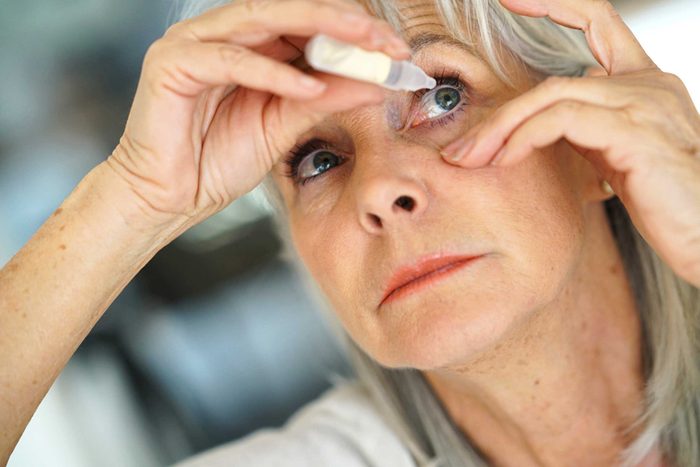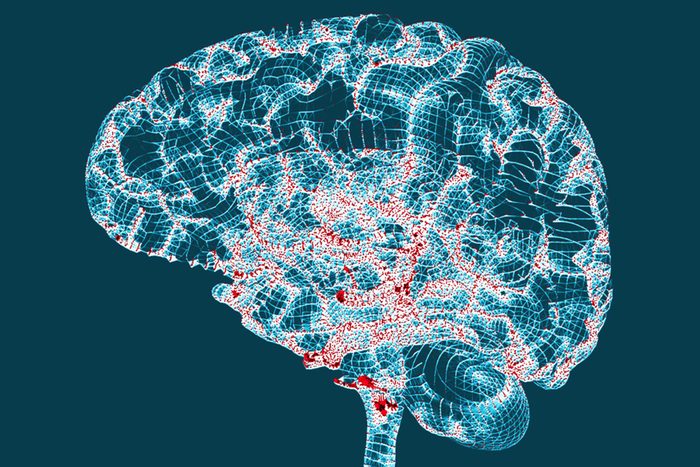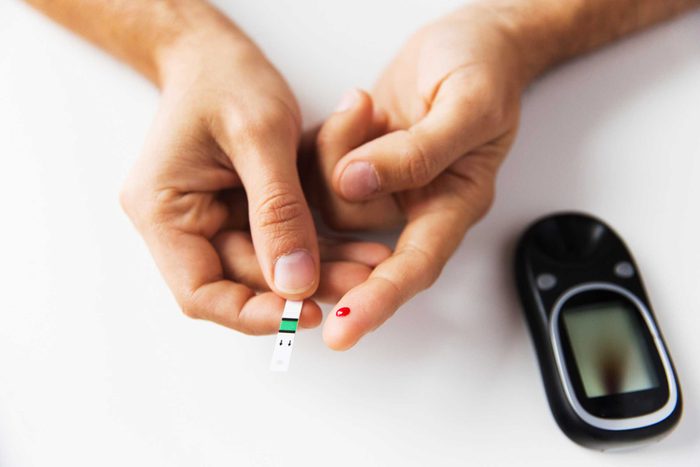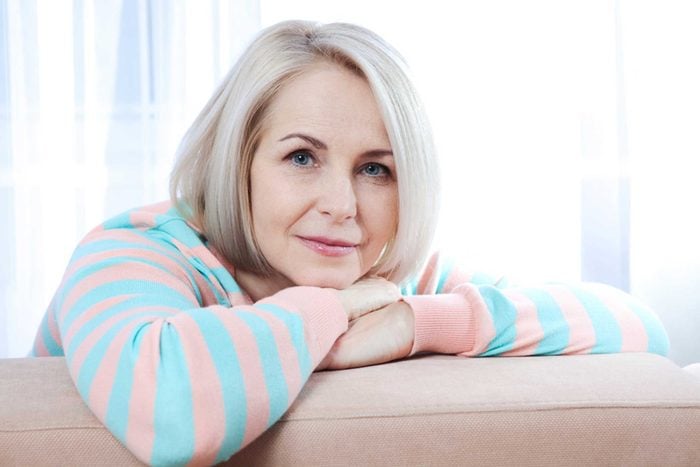Thanks, mom
Genetics play a big part in health conditions, so looking at your mom’s health can give you a clue what’s to come—and this is especially true of complications that affect women more than men. This is why it’s so important to get a complete family medical history, says Neeraj Gandotra, MD, a psychiatrist, instructor at Johns Hopkins University School of Medicine, and the Chief Medical Officer at Delphi Behavioral Health. Sometimes families don’t want to discuss these things, but it’s important to know the truth about how and why grandma died so that you can identify your own risks for these common conditions with a mother-child genetic link.

Sketchy skeleton
Case in point: Osteoporosis, a condition where your bones weaken as you age. According to the CDC, osteoporosis affects 25% of women over 65, but only 6% of men—and recent research has found genetic variants predisposing some people to the disease. “There is strong evidence for an increased risk of osteoporosis if your mother had it,” says Todd Sontag, DO, a family medicine specialist with Orlando Health Physician Associates. “Many times this has to do with an inherited body structure of having lower body weight—weighing less than 58kg [128 pounds] in adults or having a BMI of less than 22 can increase your risk of osteoporosis.” Another risk factor is simply having a parental history (mom or dad) of hip fracture, he says. To mitigate these effects, make sure you’re getting enough calcium and vitamin D and are living a healthy lifestyle.

Crepey skin
Wonder if you’re going to get wrinkles or skin damage? Take a look at your mom’s face. Male and female skin ages differently due to different hormones, according to a study published in Dermato-Endocrinology. “Your mother’s ability to break down collagen and the age when it started breaking down—the age when she got wrinkles—are passed down to you, as well as the pattern of collagen breakdown: Did she get wrinkles around her eyes first, or deeper lines around her mouth?” says dermatologist Purvisha Patel, MD, creator of Visha Skin Care. “Looking at pictures of her as she ages will help you understand how to combat your aging process.” Daily sunscreen and an anti-aging serum with retinol, vitamin C, ferulic acid and vitamin E work to fight these genetic effects, she says. In addition, your skin type—passed down from your mother and your father—can affect your chances of sun damage and skin cancer. Those with fairer skin are most at risk.
Dermatologists Say This 1970s Anti-Aging Ingredient Is Still the Gold Standard for Gorgeous Skin

Depression
You might already know that depression is diagnosed twice as often in women as in men, possibly as a result of hormonal fluctuations and women’s response to trauma and stress. “Another important aspect in gender studies shows that women have a more chronic course of depression than do men,” says psychologist Deborah Serani, PsyD, author of Living With Depression. “This means that females experience depression more often and for a longer duration of time than males.” Plus, it’s genetically linked—certain genetic mutations associated with depression occur only in women, according to a study published in Social Psychiatry and Psychiatric Epidemiology. So if your mother had depression, you should be on the lookout for symptoms, and get treatment if needed. “This is why knowing your family medical history is so important to become proactive about your own personal health,” Dr. Serani says.

Eye issues
Women are more likely to have the eye condition glaucoma, and are also more likely to be visually impaired or blind from it, says the American Academy of Ophthalmology (AAO). Thanks to menopause, women are also more likely to have dry eye syndrome, which frequently occurs with glaucoma. Plus, glaucoma runs in families—so if your mom (or dad) has it, be sure to let your eye doctor know, and get screened for it regularly, Dr. Sontag says. “You are at higher risk for developing glaucoma and [another eye condition] macular degeneration if your mother had it,” he says. “Just like everything else, there are other lifestyle factors that contribute as well.” The AAO says to also avoid smoking to reduce your risk.

Migraines
There are multiple reasons you might have a migraine, and your mother is just one of them. Women are three times more likely than men to have migraines, likely because of hormonal fluctuations, according to the Migraine Research Foundation. The National Headache Foundation notes that 70-80% of migraine sufferers have a relative who gets the debilitating attacks as well. “One of the main risk factors for migraines is a family history of migraines,” Dr. Sontag says. “So yes, if your mother has migraines, you are more likely to develop them as well.” Emerging research is identifying how and why genetics play a role. It may have to do with how the blood vessels function in the brain which may lead to migraines, according to a study published in Nature. But until we know more, if your mother suffers from migraines, you can try to reduce your risk by limiting other risk factors, like getting regular exercise and sleep, managing stress and avoiding caffeine and any individual food triggers.
Here’s How Kristin Chenoweth Overcame Years of Chronic Migraine Headaches

Alzheimer’s disease
Nearly two-thirds of those with Alzheimer’s are women, according to the Alzheimer’s Association. The exact reasons why are yet unknown, but seem to go beyond the simple fact that women live longer than men. There is an established genetic link for Alzheimer’s. “There are genetic alleles that have been identified that increase risk of developing Alzheimer’s disease,” Dr. Sontag says. “A maternal history does increase the risk.” The National Institute on Aging reports that if your mother or father has a genetic mutation for early-onset Alzheimer’s (which appears from your thirties to mid-sixties), there’s a 50/50 chance you will inherit it—and if you do, there is a strong possibility of developing the disease. If your mother had Alzheimer’s or other dementia, you can reduce your risk by exercising, eating a heart-healthy diet, maintaining social ties and staying mentally active, they say.

Weight and body type
As with many other aspects of health, the condition of your body is partly genetic, partly environmental. So if your mother has a certain body type or weight, you may be more likely to have the same one—but that could be the result of learned behaviors, too. “While there is some solid research to support a maternal’s body shape and weight and its influence on her children, this is definitely not the only contributing factor,” Dr. Sontag says. “Many times, the lifestyle of the mother is what is learned and passed down to her kids, which includes the way she eats and exercises.” So don’t beat yourself up if your natural body shape and size doesn’t look like a magazine model. However, if your mom is overweight, you can help avoid the same fate by eating healthy and exercising, with the goal of being the healthiest you can for your individual body.

Athletic ability and fitness level
Likewise, the fitness level you can achieve is part hereditary, part lifestyle, according to a study published in Medicine and Science in Sports and Exercise. The type of muscle and skeletal structure you inherit from your parents can predispose you to being good at certain sports (think height for basketball), Dr. Sontag says. “Genetics do play a strong role in our muscle make-up and no matter how much most people train, they will never be as fast as Usain Bolt or Michael Phelps,” he says. But even the best genetics aren’t of any benefit if you don’t train and practice and it’s important for people of all skill levels to get daily exercise. So even if being an Olympic gymnast isn’t in your cards, you can still use your natural genetic advantages and your drive to help you stay healthy and fit throughout your life, he adds.

Bipolar disorder and schizophrenia
Depression isn’t the only mental illness that carries a genetic link—in fact, researchers have found genetic markers for five serious mental illnesses, including bipolar disorder and schizophrenia, according to a study published in The Lancet. Families may not want to talk about their history of these disorders due to the stigma surrounding mental illness but it’s important to find out as it can affect your health, Dr. Gandotra says. “The most common medical cause of suicidal thoughts is having a mental illness, including depression, bipolar disorder and schizophrenia,” he says. “Having a mental illness doesn’t mean you will commit suicide but it can increase your risk.” Aside from suicide, these illnesses can greatly impact your quality of life and the sooner you get diagnosed and start treatment, the better you’ll feel, he adds.

Heart disease and stroke
Women may believe they don’t have to worry about heart disease, but just like men, they need to understand their genetic heart disease factors. Given genetic similarities in weight and body shape, you and your mother might also have a similar risk of heart disease—which is important to know as it’s the number one killer of women, according to the American Heart Association. Even if your family has a clean bill of health, you should be aware of other genetic factors that can increase your family’s risk, they caution. For example, statistics show that African-Americans face higher risks for high blood pressure and stroke while Hispanics are more likely to have high blood pressure and nearly half will battle high blood cholesterol, according to the AHA.

Diabetes
Diabetes is another disease that is more common in women and the risk is partially inherited, says Richard Honaker, MD, chief medical officer of Your Doctors Online. Maternally inherited gene variants of how women store fat can affect their risk of type-2 diabetes, according to a study published in Nature Genetics. But again, there are lifestyle factors to consider, he adds.
8 Sneaky Female Heart Attack Symptoms Women Might Be Ignoring

Pregnancy
If you’re looking to see what your pregnancy experience will be like, particularly when it comes to your risk for certain conditions, ask your mother about carrying you. “Gestational diabetes is more common in women who are at risk for adult-onset diabetes, which does run in families, so if you have a strong family history of diabetes, you are at increased risk for gestational diabetes,” says Pamela Berens, MD, an OBGYN with McGovern Medical School at UTHealth. Another one to look out for is preeclampsia, as it’s more common in women who have had high blood pressure, and high blood pressure may be inherited, she adds. Then there’s the characteristic nausea and vomiting associated with pregnancy—that can be inherited too. Severe morning sickness, or hyperemesis gravidarum, is more likely in women whose mothers had it as well, according to a study published in The BMJ.

Fertility problems
It’s not just pregnancy complications that you may inherit from your mom: Genetics can also influence the ease in which you get pregnant and stay pregnant, Berens says. “There appears to be an increased risk of endometriosis in first-degree relatives of women with endometriosis,” Dr. Berens says. “Rarely, some women with recurrent miscarriages can have an inherited chromosome issue that makes miscarriage more common, and genetic testing can be done.” For some other infertility conditions, such as PCOS, it’s not clear yet whether genetics are at play.

Postpartum depression
You should also ask your mom if she suffered from postpartum depression after pregnancy. Like other aspects of mental health, it may be passed from mother to daughter. “Studies show that postpartum depression is genetically linked,” Dr. Serani says. “Your risk for PPD increases if your mother, or another family member—sister, aunt—has experienced it.” Researchers found specific chemical alterations in two genes that, when they occur during pregnancy, can predict whether a woman will develop postpartum depression with 85% accuracy, according to a study published in Molecular Psychiatry. The researchers hope this will eventually lead to a blood test that can give pregnant women a better indication of their risk—but for now, knowing your family history is important. “Ask your mother about her postpartum experiences,” Dr. Serani says. “This can informally clue you in to whether or not depression is a risk factor for you.”
7 Postpartum Depression Myths That Can Be Dangerous to Believe

Breast and ovarian cancer
Awareness on the genetic link of breast and ovarian cancers may be due in part to Angelina Jolie, whose mother died from breast cancer. After discovering she carried the BRCA1 gene, the actress underwent a preventive mastectomy, reducing her breast cancer risk from 87% to under 5. “The gene mutations that are most commonly associated with hereditary breast and ovarian cancer are the BRCA1 and 2 gene mutations,” Dr. Berens says. “If you have a suspicious family history—for example, if you have multiple family members with breast or ovarian cancer, if the breast cancer happened at an early age or if the same family member had both cancers—it is more suspicious that you could have a genetic tendency.” Talk to your doctor about your individual risk if you mom or other female relatives had one of these cancers, and consider seeing a genetic counselor for genetic testing.

Menopause
The age at which your mother went through menopause will be partly responsible for when you do as well, according to a study published in the Journal of Clinical Endocrinology and Metabolism. So if your mother went through menopause early, you should let your doctor know. “Premature ovarian insufficiency, before 40, can be caused by a number of conditions, and some of these conditions can be inherited—for instance, women who are fragile X carriers,” Dr. Berens says. Fragile X is a gene mutation linked to the X chromosome, and it can trigger anxiety, hyperactivity, and intellectual disability. As for menopause symptoms such as hot flashes and night sweats, Dr. Berens says scientists are trying to clarify if there’s a genetic link. One study, published in Menopause, reports that researchers may have found the gene variant responsible for hot flashes, but more research is needed. Next, check out what your sweat says about your health.
Get The Healthy @Reader’s Digest newsletter for what’s trending in health and wellness daily. Follow us on Facebook, Instagram, and Twitter, and keep reading:
